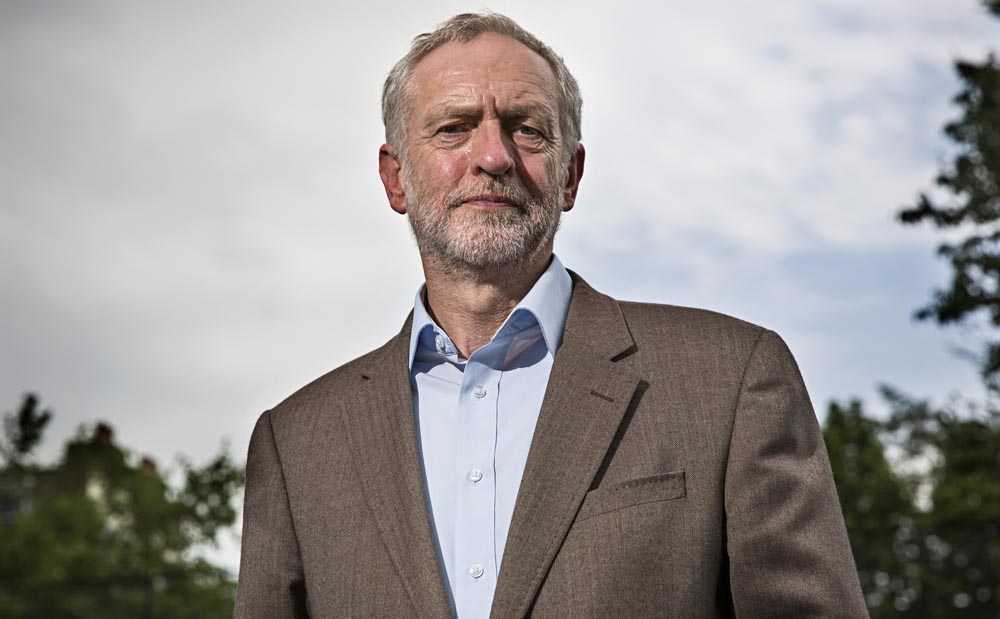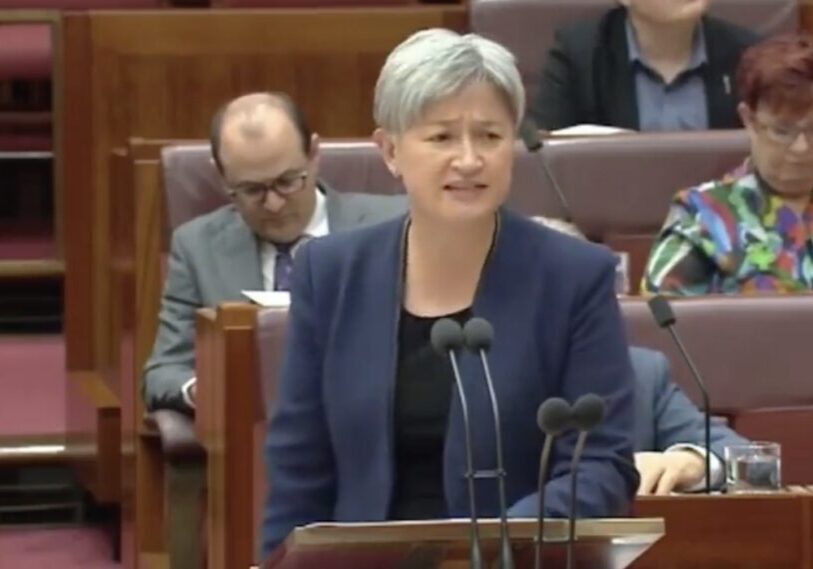Australia/Israel Review
The company Corbyn keeps
Jun 3, 2016 | Douglas Davis

If it was true that you can judge a man by the company he keeps, Jeremy Corbyn would be an Israel-hating, antisemitic, Holocaust-denier. The newly elected leader of Britain’s Labour Party would vehemently deny he is any of the above, but some of his best friends are one or more of these things.
Take the UK-based Holocaust denier Paul Eisen, who says he has been close to Corbyn for 15 years. Corbyn, he claims, has not only attended every one of the annual “Deir Yassin Remembered” events but has also contributed to his anti-Israel pressure group. Eisen recalls that when he approached Corbyn to become a member, “I’d hardly begun my feverishly-rehearsed pitch before his cheque book was on the table.”
Corbyn has also defended Stephen Sizer, an Anglican vicar in the affluent English county of Surrey. Sizer has persistently stated his belief, among others, that the Mossad perpetrated the 9/11 terrorist attacks. Following a 2015 complaint by the Board of Deputies of British Jews, he was censured by the Bishop of Guildford, who banned him from commenting on issues relating to the Middle East and from using all social media for at least six months.
Then there was the praise Corbyn heaped on Islamist Raed Salah, a proponent of the blood libel. In a speech on al-Jazeera television, translated by the Middle East Media Research Institute, Salah sounded a warning to Europeans: “You should know that we are coming to you with the compassion of Islam to deliver you from the ignominy of your slaver”, which he explained was “the subjugation of your minds to the enterprise of Theodor Herzl and David Ben-Gurion.” Corbyn invited Salah to attend a meeting of the Palestine Solidarity Campaign in Britain. British Home Secretary Theresa May declared the Islamist extremist persona non grata.
Corbyn has also shared a platform with Dyab Abou Jahjah, who declared that Europe made “the cult of the Holocaust and Jew-worshipping its alternative religion.” And Corbyn has campaigned for the release from prison of Palestinian terrorists Jawad Botmeh and Samar Alami, who detonated car bombs outside the Israeli Embassy and the offices of the United Jewish and Israel Appeal in London.
Last month, with his party beset by charges of antisemitism and suspension notices being showered like confetti, Corbyn repeatedly declined a challenge in parliament by Prime Minister David Cameron to withdraw his use of the word “friend” when describing Hezbollah and Hamas representatives whom he hosted at a meeting in parliament.
All this has had a trickle-down effect. Earlier this year, the co-Chairman of the Oxford University Labour Club, Alex Chalmers, resigned because he was concerned that a large part of his organisation – and the Oxford left generally – had developed “some kind of problem with Jews”. He cited members of the executive “throwing around the term “Zio” [a derogatory term for Jews] with casual abandon; senior Hamas-supporting members defending the indiscriminate murder of Jews, and a former co-Chair of the club claiming that “most accusations of anti-Semitism are just the Zionists crying wolf.”
If there is no direct evidence of antisemitism by Jeremy Corbyn, there is ample evidence of guilt by association. And his election to the Labour leadership last year has undoubtedly uncorked a stream of antisemitic slurs from Labour MPs, councillors, activists and members, who apparently feel that such expressions are now acceptable, even respectable.
In the past few months, some 20 Labour members have been suspended for antisemitic outbursts. Most are expected to be reinstated after a “cooling-off” period. Typical among them, and the latest to join the ranks of “suspended” last month, was Musabbir Ali, a member of the Tower Hamlets Labour Party in east London who once served as Labour’s campaign officer.
Ali tweeted a link to a blog post headed, “Timeline of the Jewish Genocide of the British People”. The blog asserted that British “Jews swore their revenge” after being expelled in 1290. It went on to inform readers that, “the Jews financed Oliver Cromwell’s overthrowing and beheading of Stuart King Charles I after he refused them control of England’s finances.” And it accused British leaders – Cromwell, Neville Chamberlain, Winston Churchill, Edward Heath and Tony Blair – of being “Jewish puppets”. Along with the 20 others, Ali has been suspended from the party “pending an investigation”, a party official confirmed last month.
But not all have been suspended. Notable among them is Gerald Kaufman, the longest-serving member of parliament, who routinely casts slurs on both Israel and Jews. Kaufman, himself Jewish, complains that Britain is “too close to Israel” and that “right-wing Jewish millionaires” control the Conservative Party, declaring at a meeting of the Palestine Return Centre last year that “Jewish money” created a pro-Israel bias among Conservatives. He asserts that “Israel was born out of Jewish terrorism” and has called for trade sanctions and an arms boycott. Israel is a “pariah state”, and he describes its senior politicians as “war criminals”.
Corbyn issued a stock statement condemning Kaufman’s remarks as “completely unacceptable and deeply regrettable.” Corbyn would not be so crass to express himself in such primitive terms – he declares his opposition to “racism, anti-Semitism and Islamophobia” – but was he really so dismayed by Kaufman’s depiction of Israel and Jewish influence?
The new Labour leader, stuck firmly in the Jurassic Park of hard-left doctrine, is a riddle wrapped in an enigma. His ideological commitment is rooted in the rusting scrapheap of Marxism-Leninism, where portraits of Stalin grace the street demonstrations he still addresses – for nuclear disarmament, against war, for the Palestinians, against… well, against almost anything that is intrinsic to Western values.
Sour and surly, 67-year-old Corbyn is no Jeremy-come-lately. He has occupied Labour’s backbenches in the House of Commons for more than 30 years and has a record of defying his party’s line on more than 500 important votes. He has the support of just a handful of the parliamentary party and was regarded as a joke by a large majority. That joke has now turned to pained embarrassment. No one seriously believes Labour can win an election with Corbyn at the helm. Nor is it likely that he would trade his clapped-out ideology for political power.
But there is no denying Corbyn’s emphatic mandate: in Labour’s byzantine electoral system, he failed to win the support of more than a handful of fellow parliamentarians: they would rather have a leader like Tony Blair who was ideology-lite but shifted Labour to the political centre ground and, from there, delivered three bumper Labour victories. Corbyn seems to prefer ideological purity to political power. But so, apparently, do key trade unions and, reflecting the age of anti-politics, some 60% of the party’s grass-roots members who voted for him.
Concern that Corbyn’s election had exposed Labour’s “Jewish Problem” was brought to a head not by any old loony Labour member, but by his long-time friend and ideological ally Ken Livingstone, the former Mayor of London.
Livingstone dropped his clanger when coming to the defence of neophyte Labour MP Naz Shah, who was suspended from the party when she suggested online that the Jews of Israel should be deported to the United States. She also compared Israel’s policies to those of Nazi Germany. In a subsequent radio interview, Livingstone conceded that her comments were “over the top”, but said Hitler had supported Zionism “before he went mad and ended up killing six million Jews.” Never a friend of Israel, Livingstone went on to repeat his “Zionist-Hitler” thesis in subsequent interviews, implying that the creation of Israel was really a Nazi-like event.
Livingstone was finally suspended by his old comrade Corbyn, who announced that he would set up an inquiry to “establish guidance about the boundaries of acceptable behaviour and language” and “develop clear and transparent compliance procedures for dealing with allegations of antisemitism and racism” within the party.
Meanwhile, there has been an opposite, if not equal, reaction from Britain’s dwindling Jewish community to the perception of antisemitic acceptability. Labour was once the natural home of Jewish voters, but according to an opinion poll last month, the party now attracts just 8.5% of Jewish support, down a massive 10% since Corbyn’s election as party leader last year. Not surprisingly, the once-substantial Jewish financial support for Labour has fallen off the cliff. One donor, David Abrahams, who had given the party about US$1 million, said he was withdrawing his support because the leadership was not doing enough to counter antisemitism.
The London-based Daily Telegraph summed it up when it commented that “responsibility for the party’s increasingly disturbing record on anti-Semitism belongs to Mr Corbyn, and it is Mr Corbyn who should account for it.”
Antisemitism has become a central feature of the left, both in Britain and more widely in Europe. The tough challenge is whether it can win back the Jews. For now, it seems unlikely that it can.
One glimmer of hope on the horizon is Labour’s Sadiq Khan, the newly elected Muslim Mayor of London, who commands a multi-billion-pound budget and is considered to be the most powerful Labour politician in Britain. He has emphatically declared that there is no room for antisemites in the Labour Party.
No sooner had Khan, a 46-year-old former centre-left member of parliament, taken over the mayoralty, than pundits were predicting that, like his Conservative predecessor, Boris Johnson, his eye is ultimately on the top job. He has made a good start. He chose to be sworn in at Southwark Cathedral and ensured that his first official act as mayor was to attend the Yom Hashoah [Holocaust Memorial Day] commemorations alongside UK Chief Rabbi Ephraim Mirvis.
In a continent alive with the stirrings of Islamist radicalism, the election of Khan, the son of an immigrant bus driver, sends a powerful message: that despite his humble beginnings he was able to persuade London’s diverse population that he had the most effective and pragmatic program for guiding Europe’s powerful financial centre.
In the process, he also took the opportunity to distance himself from Corbyn and from his party’s flirtation with antisemitism. It took Corbyn fully four days to make the 15-minute drive from his office at Westminster to City Hall to offer a grudging message of congratulations to the new mayor.
Khan himself has also been accused of keeping dubious company, but that, he insists, was part of his duty as a human rights lawyer. Everyone, he had argued, is entitled to a legal defence.
Still, the new Mayor, the highest-ranking Muslim politician in Europe, is a harbinger. He will attract intense scrutiny because of his Muslim background and will have to remain squeaky clean. He will also, if he so chooses, have a key role to play in rooting out extremism among young British Muslims, acting as a role model and using his office to help educate them on the necessity – and the rewards – of integration.
High hopes will be riding on his relatively untried shoulders.
Tags: Anti-Zionism, United Kingdom






